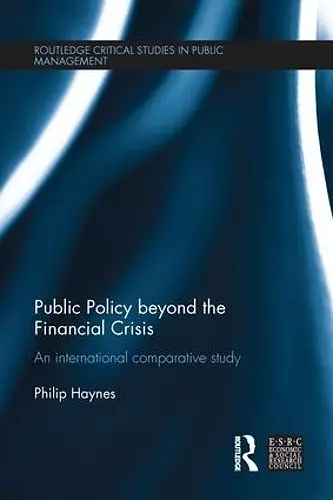Public Policy beyond the Financial Crisis
An International Comparative Study
Format:Paperback
Publisher:Taylor & Francis Ltd
Published:4th Aug '16
Currently unavailable, and unfortunately no date known when it will be back
This paperback is available in another edition too:
- Hardback£150.00(9780415674393)

The economic crisis of 2008-2009 and beyond has provided the greatest challenge to public policy in the developed world since the Second World War, as the use of public monies to support banks and declining tax revenues have resulted in rising government borrowing and national debt.
This book evaluates the failures of public policy in the half decade before the crisis, using the conceptual framework of complex systems. This analysis reveals the fundamental failings of globalization and the lack of a robust and resilient public sector paradigm to assist countries in economic recovery. The research has benefited from UK Economic and Social Research Council (ESRC) funding for a Knowledge Exchange that applied the most relevant and applied aspects of complex systems theory to contemporary policy problems.
Innovative statistical methods are used to profile and group countries both before and after the 2008-09 crisis. This shows the countries that are best prepared for the ongoing and prolonged Euro zone crisis of 2010-12. The book proposes a new model of public policy that asserts itself over the paradigm of market liberalism and places the public values of full employment, sustainability and equality at the top of the post crisis policy agenda.
'Philip Haynes has produced an important book for anyone who wishes to understand why the global financial crisis developed in the way it did. He explores the reasons why governments throughout the world reacted with certain policies. Haynes takes difficult mathematically-based concepts, such as complexity theory and applies them to deliver an understanding of the policy context for the way the financial crisis developed across a range of countries. He shows the strengths and limitations of markets and policy makers in both the governing institutions and private sectors. It is a clearly written and methodologically and theoretically innovative book; it should be required reading for practitioners and academics alike.'
Andrew Massey, University of Exeter, UK
'The global financial crisis continues to cast a long shadow. There are scholarly works on the nature of the crisis of 2008. Philip Haynes takes this further. His articulate and lucid analysis of the original crisis and the manner in which the corporate debt crisis of banks became an issue of sovereign debt and the consequent and current policy options confronting governments makes this book essential reading for all interested in this, the most topical subject of the 21st century.'
Irvine Lapsley, University of Edinburgh, UK
'Those of us who wanted the social sciences to take a turn to complexity have always understood that the test of that turn would be the use of complexity ideas in addressing major social and political issues. No issue could be more important than the current economic crisis. In this book Phil Haynes deploys the full repertoire of complexity related methods in a way which greatly illuminates our understanding of what has happened and what might happen going forward. This is an exemplary book in terms of method and a fundamentally important one in terms of its substantive focus.'
David Byrne, Durham University, UK
ISBN: 9781138205970
Dimensions: unknown
Weight: 340g
224 pages